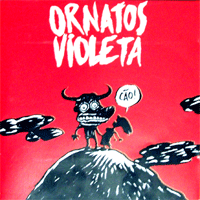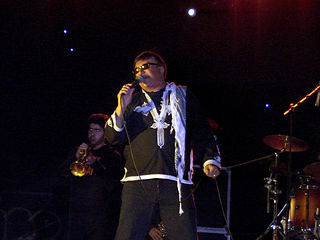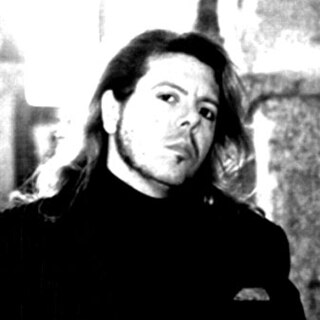
Carlos ParedesComSE was a virtuoso Portuguese guitar player and composer. He is regarded as one of the greatest players of Portuguese guitar of all-time.
Rock music and its subgenres are very popular in Portugal. The history of the Portuguese rock music scene spans several decades.

Jorge Manuel de Abreu PalmaComIH is a Portuguese singer and songwriter.

Rui Manuel Gaudêncio VelosoComIH is a Portuguese singer-songwriter and musician.
GNR is a Portuguese pop rock band formed in Porto in 1980 and currently consists of vocalist Rui Reininho, bassist Jorge Romão and the only remaining founding member drummer Tóli César Machado. The formation of the group, that shares its acronym with the Guarda Nacional Republicana, coincided with the so-called Boom of Portuguese Rock that took place during the eighties, of which GNR are one of the few survivors to this day.

Cão! was the first studio album by Portuguese rock band Ornatos Violeta, released on 15 September 1997 by Polygram. Three singles were released from this album: "Punk Moda Funk", "A Dama do Sinal" and "Mata-me Outra Vez".

Mão Morta is a Portuguese avant-garde rock band that started its activities in 1985 in Braga. The group's name means "dead hand", based on a traditional Portuguese nursery rhyme. They are generally considered to be one of the most important bands in the Portuguese rock scene and have since reached a cult status. Since the start of their career, their live concerts became famous for their intensity and dark mood, due to their signature alternative rock sound and the performance of vocalist Adolfo Luxúria Canibal, known for occasional onstage theatrics and his gravelly voice, half-sung, half-spoken singing style. Mão Morta's music is difficult to categorize as they incorporate a variety of genres; from punk rock, metal, to industrial and experimental. Their sound, combined with Adolfo's lyrics, reflects urban violence, a human search for pleasure, freedom and a critique of contemporary consumerist society, often with sarcastic humour.

José Albano Cid de Ferreira Tavares is a Portuguese singer, composer and record producer. Internationally, Cid is best known for his 1978 progressive rock album 10,000 Anos Depois Entre Vénus e Marte and for representing Portugal at the Eurovision Song Contest 1980 with the song "Um grande, grande amor".
Banda do Casaco was a Portuguese prog-folk band active from 1974 to 1984 considered by some to be one of Portugal's greatest progressive rock bands. Their seminal album was Hoje há Conquilhas, Amanhã não Sabemos, released in 1976.

Pedro Luís Neves is a Portuguese modern composer of classical music and author of several other genres.

Flowers and the Color of Paint is a 1995 travel-oriented hip hop, downtempo and spoken word album by Californian lyricist, vocalist and visual artist, Ithaka.

Gisela Joao Gomes Remelho is a Portuguese fado singer.
The 2004 Golden Globes (Portugal) were held at the Coliseu dos Recreios, Lisbon on 25 May 2004.

Nancy Vieira is a Cape Verdean singer who was born in Guinea-Bissau and currently resides in Portugal.

Ao Vivo (Live) is the first live album by Rui Veloso. It was released through EMI-Valentim de Carvalho in late 1988.

Mingos & Os Samurais is the fifth studio album by Portuguese musician Rui Veloso, released on 7 August 1990 by EMI-Valentim de Carvalho. It is a concept album that tells the story of a small suburban band during the 1960s and the 1970s.

Júlio Resende is a Portuguese pianist and composer. He is a pioneer of a unique and new genre called "Fado-Jazz". His improvisation techniques are transversal to his aesthetics, and articulate different musical genres, from Jazz, Fado, Classical Music and even Electronic Music.

Marta Dias is a São Toméan Portuguese singer of jazz, world music and fado who has recorded several solo albums and has additionally recorded and toured extensively with guitarist António Chainho. She has also appeared on several Hip hop releases, including the Ithaka song, Escape From The City Of Angels, which appeared in Columbia Pictures's feature film release, The Replacement Killers in 1998.

Linda Martini are a Portuguese rock band based in Lisbon, formed in 2003. Originally a five-piece, the band was founded by André Henriques, Pedro Geraldes (guitar), Sérgio Lemos (guitar), Claúdia Guerreiro (bass) and Hélio Morais (drums). The band recently added Rui Carvalho as a full time fourth member after a brief period acting as a trio.

Os Dias da MadreDeus is the debut studio album by Portuguese group Madredeus. It was released in December 1987 by EMI-Valentim de Carvalho.
















